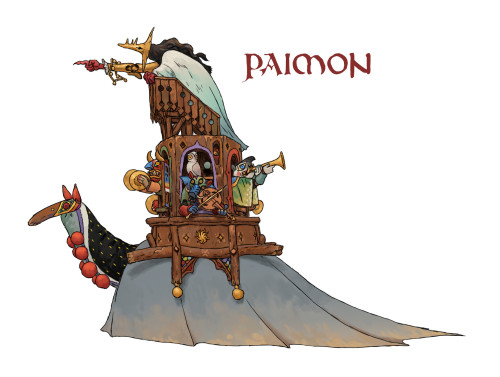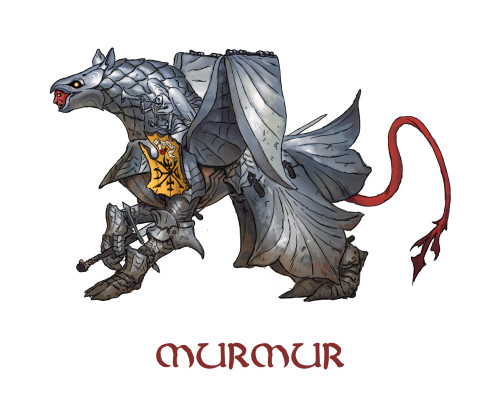
A side blog where I'll *try* to keep things organised.yeahthatsnotgoingtolastlong
241 posts
Latest Posts by thejunkdrawers - Page 6
Sometimes I’m looking for something online - often “how to” articles - and I want to filter for - like - a website that was clearly built in 2010 at the latest, which may or may not have been updated since then, but contains a vast wealth of information on one topic, painstakingly organized by an unknown legend in the field with decades’ worth of experience. I don’t want a listicle with a nice stolen picture in a slideshow format written by a content aggregator that God forgot. I want hand-drawn diagrams by some genius professor who doesn’t understand SEO at all, but understands making stir-fries or raising stick insects better than anyone else on this earth. I don’t know what search settings to put into Google to get this.
Your OPSEC is Bad and You Should Feel Bad
Okay so one of the many things that drives me absolutely nuts about most TV shows and (some) books that involve secret or classified information or secure facilities is how absolutely not secure everything is, so these are a few basic things that people get wrong:
You can't carry around classified information. There are, I assume, exceptions in specific cases, though they are assuredly very carefully managed, but random intel agent #12 cannot legally just take home classified information so they can work on it at home. That's incredibly illegal. And that's for a reason--secure facilities are, as the name suggests, secure. Everywhere else is varying levels of not secure. Even for people working with regular business or government materials on their work phone or laptop, there are varying levels of strict rules about where you can leave it, how to report a lost device, and not keeping it in checked bags.
Badges should be innocuous and limited in visible information. Any sensible security system doesn't have badges that are numbered/colored/otherwise identified by access level, because that is a really easy way to identify targets for thieves/people who want to break in. American federal ID cards (CAC for military, PIV for civilian) have really specific layouts. Some companies distinguish between full time employees, interns, vendors, etc in their cards.
Badges shouldn't be displayed outside of the office. This is not really followed by real people (if you get on the metro on DC you will see a wide variety of visible badges), but displaying a badge is not security-wise because 1) it makes them easier to steal, and 2) it can make you a target.
Names/access level/information shouldn't be openly announced. I'm looking at you, MCU Spider-Man fanfiction. Just. Don't.
Confidential/classified information shouldn't be openly discussed. Stop having your characters talk about confidential or classified information in front of people who shouldn't know it, or even just out in the open at all. They shouldn't be telling their parents, their friends, their spouses, etc. Even businesses or government buildings that deal with sensitive information, there may be spaces where certain things can or can't be discussed, and employees/contractors will go through approximately 8 million trainings on where you can't discuss certain information. This also involves erasing whiteboards, locking computers, etc.
You can't have cell phones in certain secure facilities. People shouldn't be having their cell phones with them in SCIFs. This prohibition extends to all things that can be recording devices, including furbies.
I love that RPG race trail rations post, and it got me thinking about non-Eurocentric fantasy trail rations. I focused on Central and South Asian cuisines (as I also needed the information for a project I’m working on). I looked for foods that were easy to carry (dry or dehydrated), easily obtainable in markets/easily foraged, easy to cook/not needing cooking at all, and high in protein/generally filling. Many foods had language-specific names and some overlapped into different regions, so I bare-bones’d the names. This is what I came up with:

Dried curd comes in many forms – kashk, aaruul, quroot, etc. – and was of particular interest to me, since I learned it was used since (and before) medieval times as a trail ration for soldiers and travelers because it is lightweight and high in protein. The more you know. 🌈
Tempeh is one of my favorite food options, but I should note that it originates from Southeastern Asia, Indonesia in particular.
Bamboo is extremely handy for use as both a carrying and cooking vessel, and would save a character the hassle of bringing a skillet with them (provided the character is in an area with large bamboo and a water source). It’s a method still used today because it’s extremely efficient. Storing eggs in rice is a good way to travel with them and keep them from cracking for a short time.
These are just some basics and I’m only scratching the surface, so if anyone has foods to add from these regions (East and Southeast Asia, too!), or any non-European region honestly, don’t hesitate to add them!
for anyone who is unaware ena dream bbq is out NOW on steam. <- just found out and was fucking jumpscared


Initiation Well Location: Sintra, Portugal
A pair of wells, called the Initiation Wells, spiral down deep within the earth, like inverted towers. The wells were never used to collect water. Instead, they were part of a mysterious initiation ritual within the Knights of Templar tradition.
HOW AM I JUST NOW LEARNING that there's a 90s cartoon about a crossdressing vigilante hunting down zombies who looks like THIS:


with the goons in question being led by a little kid who uses 'YOU FOOLS' in every other sentence named JOSE VON REICHTER.
JOSE
VON
GODDAMN
REICHTER
who looks like THIS:


AND the animation of FLIPPIN' Trigger!?

Was ANYONE going to tell me??



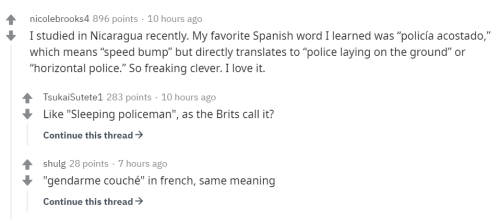
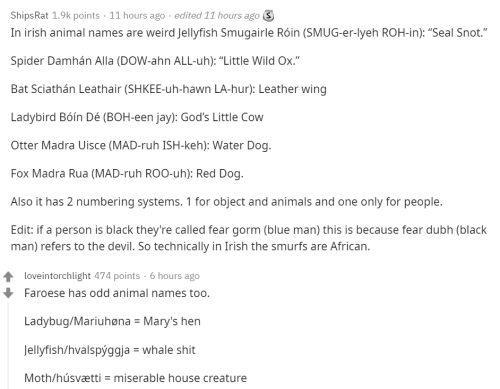





Not bad for a bunch of random noises we make with our mouths. Well done, everyone.
Words to replace said, except this actually helps
I got pretty fed up with looking for words to replace said because they weren’t sorted in a way I could easily use/find them for the right time. So I did some myself.
IN RESPONSE TO Acknowledged Answered Protested
INPUT/JOIN CONVERSATION/ASK Added Implored Inquired Insisted Proposed Queried Questioned Recommended Testified
GUILTY/RELUCTANCE/SORRY Admitted Apologized Conceded Confessed Professed
FOR SOMEONE ELSE Advised Criticized Suggested
JUST CHECKING Affirmed Agreed Alleged Confirmed
LOUD Announced Chanted Crowed
LEWD/CUTE/SECRET SPY FEEL Appealed Disclosed Moaned
ANGRY FUCK OFF MATE WANNA FIGHT Argued Barked Challenged Cursed Fumed Growled Hissed Roared Swore
SMARTASS Articulated Asserted Assured Avowed Claimed Commanded Cross-examined Demanded Digressed Directed Foretold Instructed Interrupted Predicted Proclaimed Quoted Theorized
ASSHOLE Bellowed Boasted Bragged
NERVOUS TRAINWRECK Babbled Bawled Mumbled Sputtered Stammered Stuttered
SUAVE MOTHERFUCKER Bargained Divulged Disclosed Exhorted
FIRST OFF Began
LASTLY Concluded Concurred
WEAK PUSY Begged Blurted Complained Cried Faltered Fretted
HAPPY/LOL Cajoled Exclaimed Gushed Jested Joked Laughed
WEIRDLY HAPPY/EXCITED Extolled Jabbered Raved
BRUH, CHILL Cautioned Warned
ACTUALLY, YOU’RE WRONG Chided Contended Corrected Countered Debated Elaborated Objected Ranted Retorted
CHILL SAVAGE Commented Continued Observed Surmised
LISTEN BUDDY Enunciated Explained Elaborated Hinted Implied Lectured Reiterated Recited Reminded Stressed
BRUH I NEED U AND U NEED ME Confided Offered Urged
FINE Consented Decided
TOO EMO FULL OF EMOTIONS Croaked Lamented Pledged Sobbed Sympathized Wailed Whimpered
JUST SAYING Declared Decreed Mentioned Noted Pointed out Postulated Speculated Stated Told Vouched
WASN’T ME Denied Lied
EVIL SMARTASS Dictated Equivocated Ordered Reprimanded Threatened
BORED Droned Sighed
SHHHH IT’S QUIET TIME Echoed Mumbled Murmured Muttered Uttered Whispered
DRAMA QUEEN Exaggerated Panted Pleaded Prayed Preached
OH SHIT Gasped Marveled Screamed Screeched Shouted Shrieked Yelped Yelled
ANNOYED Grumbled Grunted Jeered Quipped Scolded Snapped Snarled Sneered
ANNOYING Nagged
I DON’T REALLY CARE BUT WHATEVER Guessed Ventured
I’M DRUNK OR JUST BEING WEIRDLY EXPRESSIVE FOR A POINT/SARCASM Hooted Howled Yowled
I WONDER Pondered Voiced Wondered
OH, YEAH, WHOOPS Recalled Recited Remembered
SURPRISE BITCH Revealed
IT SEEMS FAKE BUT OKAY/HA ACTUALLY FUNNY BUT I DON’T WANT TO LAUGH OUT LOUD Scoffed Snickered Snorted
BITCHY Tattled Taunted Teased
Edit: People, I’m an English and creative writing double major in college; I understand that there’s nothing wrong with simply using “said.” This was just for fun, and it comes in handy when I need to add pizzazz.

BOOK OF KELLS BOOK OF KELLS BOOK OF KELLS BOOK OF KELLS
How do I describe a tired person? I got 'dark circles under the eyes' but it kind of stops there.
I think we need to take the “what if the conventional monster was friendly?” thing in fantasy worldbuilding further. “What if the dragon was friendly?” and “what if the orcs across the valley were friendly?” are well and good, but I’m thinking more like “what if the animated skeletons in the local graveyard were friendly?”
I think with the animated skeletons in particular the key is to play up their separation from the living in a way that’s still kinda creepy, but in an odd way rather than a horrific way. Something like:
Animated skeletons are explicitly not just skeleton versions of the living people their bones came from, and in fact don’t seem to have much in the way of individual identity – or, at least, if they do, they don’t express it in the way that humans do.
They aren’t impaired by the loss of individual bones – including the skull! – and can freely swap bones among themselves. The same pile of loose bones won’t always animate into the same number or configuration of skeletons, nor does having more available bones necessarily translate into more skeletons.
Consequently, questions like “how many skeletons are there?” are difficult to answer.
Animated skeletons generally seem to understand both spoken and written languages, but don’t have much capacity for producing language; they don’t speak or write, and their capacity for signing is limited to stuff like nodding or shaking their head for “yes” or “no“, pointing to indicate objects or directions, etc.
In spite of this, they appear to be able to communicate complex information and ideas amongst themselves, but it happens via some undetectable, (presumably) non-language-based medium.
Their otherwise limited expressive capacity notwithstanding, skeleton “culture” (if that’s the word for it) is very big on making music. Instruments and sheet music are among the few material goods that skeletons value, though the former are typically limited to those that can be operated without breath.
(This generally means percussion and strings. Wind instruments that can be operated without breath are an occasional feature; pipe organs are a big deal in those skeleton communities that can get their phalanges on them, as are a modified form of bagpipes, operated by two-skeleton teams where one plays the music and the other inflates the bag with a portable bellows.)
Apart from music, skeletons are mostly into repetitive manual labour, though exclusively on a volunteer basis, as they’re uninterested in payment and will simply collapse into inanimate piles of bones if coerced. If you want a skeleton to do something for you, be prepared to explain why, in detail, to a silent, motionless, and expressionless audience.
Skeletons are notably more likely to heed a request from a priest or religious scholar than from laypersons. There are a lot of theories as to why this is; the skeletons themselves are disinclined to comment.
A skeleton with nothing better to do may squat like a gargoyle near some well-trafficked location and observe local goings-on, remaining motionless apart from turning its skull toward points of interest for days or weeks on end. It’s generally considered polite not to draw attention to their presence.
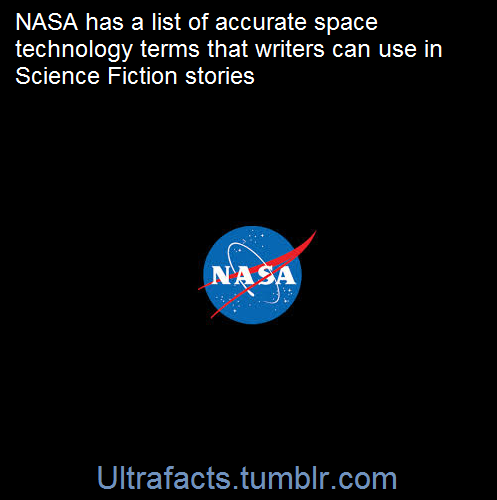
For any writers: http://er.jsc.nasa.gov/seh/SFTerms.html
For more facts, follow Ultrafacts
Oh my gosh. I just found this website that walks you though creating a believable society. It breaks each facet down into individual questions and makes it so simple! It seems really helpful for worldbuilding!
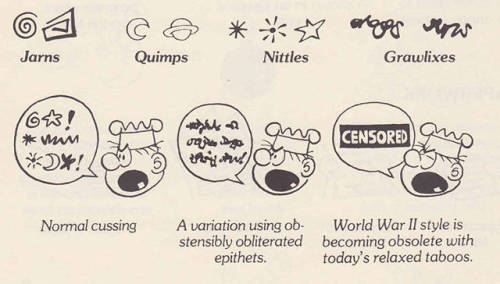
So it occurred to me that ‘grawlix’ is sort of an obscure and specialized word, but what I didn’t know until I was googling around just now is that it was actually invented by cartoonist Mort Walker in his 1980 book The Lexicon of Comicana, in which he categorizes (and invents terminology for) all kinds of visual cues and shorthand commonly used in comics


In other news, this is now right up there with The Meaning of Liff as ‘books of made up words I desperately need to own”
Have you heard about mole genders?










I’ve heard of this concept in sci-fi, but thought it was absolutely made up. I know some fish and frogs can change genders, but not in cycles like this. Wild. If I slapped this down in some alien world without explanation, I’d laugh in my own face. But no, real biology IS that bizarre.
Image descriptions:
Keep reading
I get why fantasy authors would default to using, like, the same basic arrangement of seasons and weather and gravity that we have here in The Real World because they have to make up so much shit as it is and it IS probably good praxis to give your readers some familiar touchstones in your world so they can just focus on the plot, but. having said that. I think there should be more settings that have seventeen seasons, all of them different lengths, and constellations that don't have fixed patterns because sometimes they'll get pissy and just move to a different part of the sky, and sometimes the sun tells people things telepathically, and there's a type of weather where the air just gets really thick and difficult to walk through that's unpleasant but not any more uncommon than rain. it's called smärklf.
People, especially games, get eldritch madness wrong a lot and it’s really such a shame.
An ant doesn’t start babbling when they see a circuit board. They find it strange, to them it is a landscape of strange angles and humming monoliths. They may be scared, but that is not madness.
Madness comes when the ant, for a moment, can see as a human does.
It understands those markings are words, symbols with meaning, like a pheromone but infinitely more complex. It can travel unimaginable distances, to lands unlike anything it has seen before. It knows of mirth, embarrassment, love, concepts unimaginable before this moment, and then…
It’s an ant again.
Echoes of things it cannot comprehend swirl around its mind. It cannot make use of this knowledge, but it still remembers. How is it supposed to return to its life? The more the ant saw the harder it is for it to forget. It needs to see it again, understand again. It will do anything to show others, to show itself, nothing else in this tiny world matters.
This is madness.


refseek.com

www.worldcat.org/

link.springer.com

http://bioline.org.br/

repec.org

science.gov

pdfdrive.com
Pro Tip: The Way You End a Sentence Matters
Here is a quick and dirty writing tip that will strengthen your writing.
In English, the word at the end of a sentence carries more weight or emphasis than the rest of the sentence. You can use that to your advantage in modifying tone.
Consider:
In the end, what you said didn't matter.
It didn't matter what you said in the end.
In the end, it didn't matter what you said.
Do you pick up the subtle differences in meaning between these three sentences?
The first one feels a little angry, doesn't it? And the third one feels a little softer? There's a gulf of meaning between "what you said didn't matter" (it's not important!) and "it didn't matter what you said" (the end result would've never changed).
Let's try it again:
When her mother died, she couldn't even cry.
She couldn't even cry when her mother died.
That first example seems to kind of side with her, right? Whereas the second example seems to hold a little bit of judgment or accusation? The first phrase kind of seems to suggest that she was so sad she couldn't cry, whereas the second kind of seems to suggest that she's not sad and that's the problem.
The effect is super subtle and very hard to put into words, but you'll feel it when you're reading something. Changing up the order of your sentences to shift the focus can have a huge effect on tone even when the exact same words are used.
In linguistics, this is referred to as "end focus," and it's a nightmare for ESL students because it's so subtle and hard to explain. But a lot goes into it, and it's a tool worth keeping in your pocket if you're a creative writer or someone otherwise trying to create a specific effect with your words :)
Mentally combining the "bees are unionized and will leave if they don't like their working conditions" post with the various "humans stow away on alien spaceships and do the jobs that are too dangerous for more fragile species" posts
so metropolitan museum of art has a register of books they’ve published that are out of print and that you can download for free! they’re mostly books on art, archeology, architecture, fashion and history and i just think that’s super useful and interesting so i wanted to share! you can find all of the books available here!
Hear The Oldest Flute In The World
In 2008, archaeologists discovered fragments of flutes carved from vulture and mammoth bones at a Stone Age cave site in southern Germany called Hohle Fels. They were carved and played by Homo sapiens. These flutes are ancient, dating back 42,000 to 43,000 years, making them the oldest flutes in the world.
The oldest Homo sapiens flutes, that is. There is at least one flute made by a Neanderthal that is older. Found at a Neanderthal campsite at Divje Babe in northwestern Slovenia, the Neanderthal flute is estimated to be over 43,000 years old and perhaps as much as 80,000 years old.
The video above features Ljuben Dimkaroski, who plays trumpet for the Ljubljana Opera Orchestra, and who helped archaeologists figure out how to play the prehistoric flute. Don’t worry! He is playing a clay replica, not the original.







